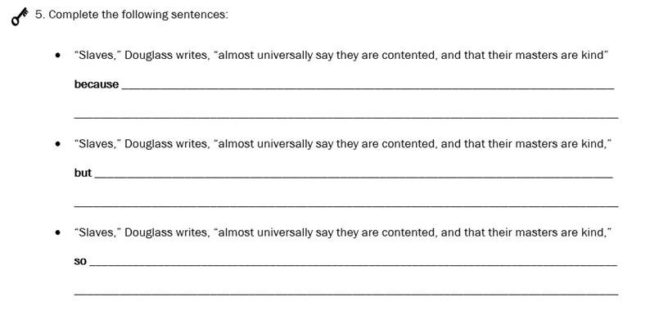02.27.19“Because, But, So” Goes 2.0 with Direct Quotations

I had a great meeting yesterday with ace curriculum developer Jen Rugani to discuss lesson plans she’s been developing for our unit on Narrative of the Life of Frederick Douglass. In the course of the meeting, we developed a new application for one of our favorite developmental writing exercises.
The exercise is called Because, But, So and it comes from Judith Hochman’s amazing book the Writing Revolution. In our curriculum we typically have students complete a Because, But, So after reading or discussing an important passage from a book. We give them a ‘kernel sentence’–a simple sentence containing a statement about the ideas in the passage–and ask them to expand the sentence three different times, once each using the conjunctions Because, But and So. This develops students’ ability to craft complex sentences while causing them to reflect on and process the ideas in the text in different ways.
Jen’s lesson plan focused on the passage from Narrative of the Life where Douglass explodes the myth of the happy slave. She wanted to cause students not only to make sense of why and how Douglass wrote this segment of the book, but also to prepare them to write analytical papers in which they were able to cite Douglass directly. This, as you know if you are a teacher in any of the humanities, is a constant challenge for students. They often struggle to deftly include quotations and weave an argument around them, and fall back on dropping quotations undigested into the body of a paragraph.
Jen decided to build her kernel sentence around a direct quotation from Douglass and then ask students to add their own commentary and ideas in the same sentence via the Because, But, So. In other words she caused them to practice weaving a direct quotation into a sentence and add their own insight three different ways.
Here’s what it looked like when she was done:

As part of her planning process, by the way, Jen always writes ‘exemplars’: model answers of what she hopes students may write. This helps her to set a high standard for responses and identify what is lacking in answers that are part of the way there. Here are the exemplars that Jen wrote for this question:
-
-
- “Slaves,” Douglass writes, “almost universally say they are contented, and that their masters are kind” because they are afraid of being punished if they say otherwise.
- “Slaves,” Douglass writes, “almost universally say they are contented, and that their masters are kind” but they don’t really mean it as they cannot speak honestly
- “Slaves,” Douglass writes, “almost universally say they are contented, and that their masters are kind” so their true feelings remain unexpressed and unheard. [or so some people falsely believe they are happy.]
-
I thought this was a super idea- a great way to use a powerful writing tool like Because, But, So to specifically help students quote directly with nuance, combining both an author’s words and their own interpretation in a single sentence. Hope you’re able to apply this idea as well in your own lessons.
